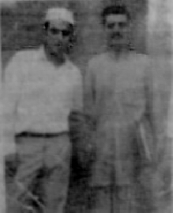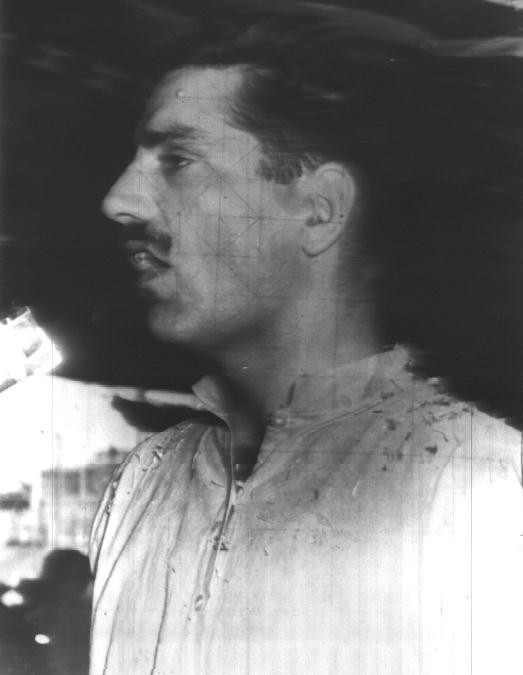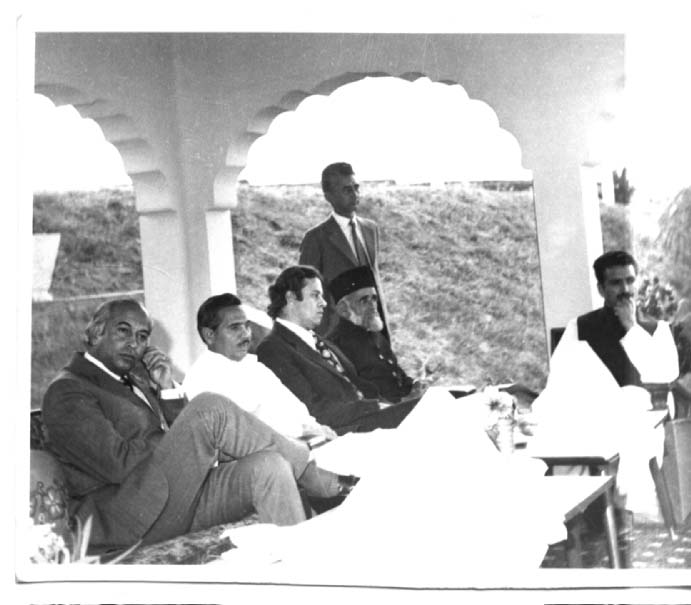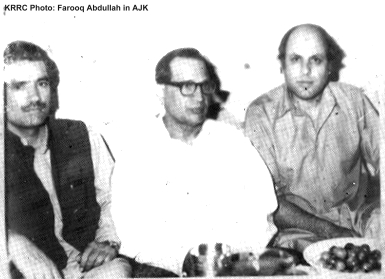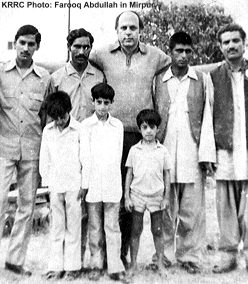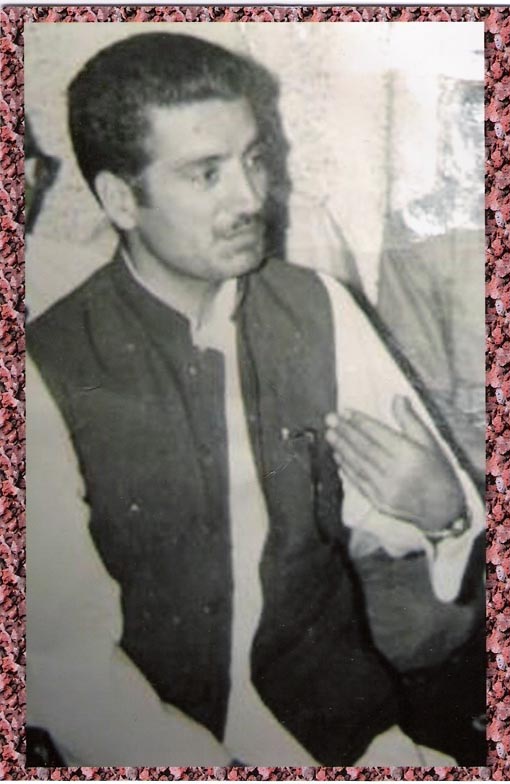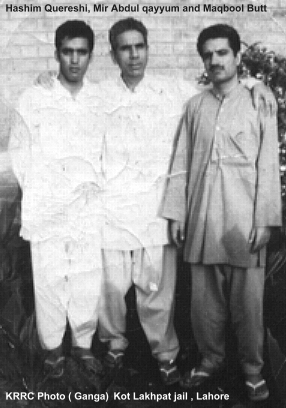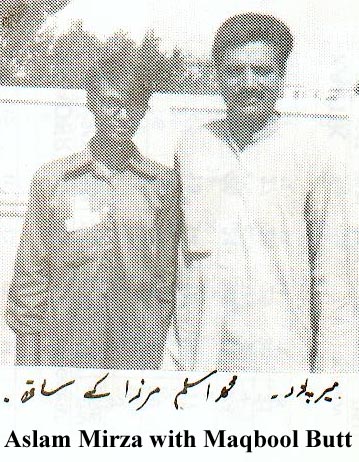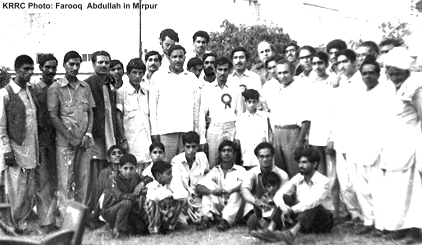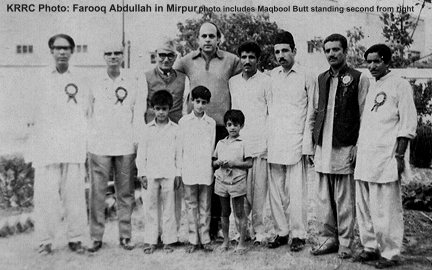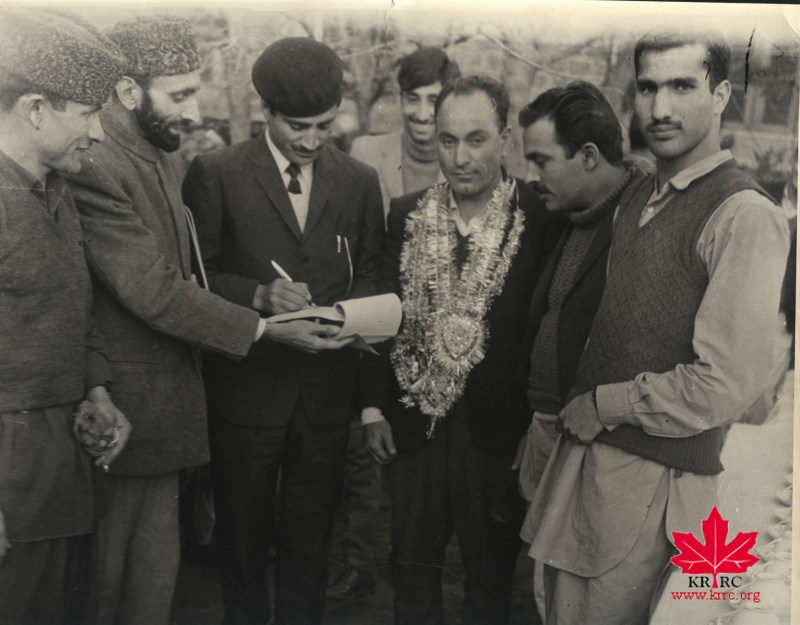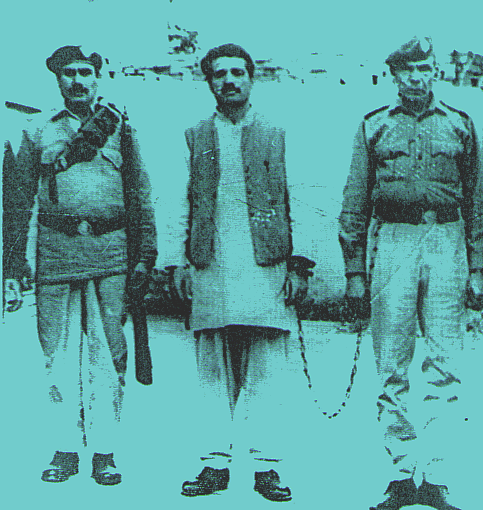Maqbool Butt: Bring Him Home
By Usmaan Raheem Ahmad
Like July 13th, February 11th is one of the occasions of import to
commemorate on the modern Kashmiri calendar. But for me, like countless others,
February 11th is the most pertinent and moving day to remember. It is an occasion to
solemnly commit to memory the life, struggle, and sacrifice of a great son of
the soil: Maqbool Butt.
While his dear and respected Kashmiri mother in Trehgam will always dotingly
know him as “Totha†or “Dear one†, the Kashmiri nation today recognizes
him as “Baba-e-Quom†or “Father of the Nation.â€
Like he is for so many others, Maqbool Butt is my hero and an example of
fortitude and courage to endeavor to emulate in my life. I count myself lucky to
have met and worked with many people who knew him during his life. And it
always fills my heart with hope and inspiration to hear even just a small detail
or first-hand account of his life: something he said, the way he would smile,
his determined manner, his patient nature, his humanistic vision, etc.
Maqbool Butt stands out not only as the founder of the Kashmiri national
independence struggle, but also as one of the special global personalities in
the modern history of national freedom struggles and struggles against injustice.
Maqbool Butt is Kashmir’s Bhagat Singh, Omar Mukhtar, Martin Luther King,
Mandela, and Ernesto Che Gueverra rolled into one. Over time, when the movement
he inspired reaches its destined crescendo, the world will come to learn more
about Maqbool Butt and he will surely be mentioned in the annals of history
along with such stalwarts of freedom. Certainly, the future Kalhana’s of
Kashmir will record his name as chief among the myriad of other modern Kashmiri heroes
in the “River of Kings†they will write about the epic Kashmiri struggle for
freedom.
However, Maqbool Butt must never become an empty icon whose name we mention
only in passing or once a year. The act of remembering should never be a simple
recollection, it must be a continuing effort to inform and enrich the
narrative of our struggle for the independence of Kashmir. The Kashmiri struggle
is passing through a difficult phase, with growing cynicism and disillusionment
spawned by the never-ending political theater of certain corrupted and co-opted
Kashmiri leaders and a consistent and deliberate psychological operation –
termed “psy-op†in military parlance – to erode the resolve of Kashmiris
to seek
what is rightfully theirs.
Given these circumstances, the act of remembering Maqbool Butt on February
11th is thus much more than just a perennial event of protest and eulogy: it is
an act of re-commitment to the vision and dream of Maqbool Butt for a just and
independent Kashmir. And while this act may seem minor in comparison to the
formidable challenges that stand in the way, in reality it will only be this
dream coupled with faith that will carry the movement forward just as it has
fuelled the movement for more than two decades now. Re-committing is itself a
glorious act of rebellion against oppression and exploitation – the same
things Maqbool Butt rebelled against. But it is also an act of working for something
very special – the same dream that Maqbool Butt worked for.
In this regards, the book of compiled letters of Maqbool Butt, titled
Shaur-e-Farda or “Awareness of Tomorrow†, is essential reading for every
Kashmiri.
To me, the postcard he sent to one Mian Sarwar at Badshah Bridge about the
sacrifice of Hazrat Ibrahim (AS) on the occasion of Eid-ul-Adha is the most
beautiful glimpse of his sincerity, vision and conviction.
A collective and careful remembrance of the underlying vision and dream for
which Kashmiris embarked on this national journey in the footsteps of Maqbool
Butt is an important means of maintaining the type of organic narrative of
living, breathing ideals that will keep alive the struggle and ensure success in
the same way that other freedom struggles have.
Maqbool Butt sacrificed his life, his everything at the gallows of Delhi to
awaken his nation out of slavery and therefore there is only one way to return
the favor to him – we must strengthen our resolve and re-commit ourselves to
the struggle. This would be an answer to the many prayers Maqbool Butt made
during his many stints behind the iron bars of Pakistan and India during his
life.
Indeed, writing a response to a loving letter received from a young Azra Mir
(daughter of GM Mir, former president of NLF) in 1973 from a prison in Lahore,
Butt expressed this wish:
"I pray to God that He may increase your power of imagination and
understanding and enrich the strength of feelings you have about our enslaved
nation. May Allah enable you to become a daughter of Kashmir we could take pride in. . .
.The helplessness you felt out there (at seeing your parents behind bars) kept
us restless here inside the prison walls. But we faced every form of torture
with the belief that this (new) challenge we are facing may temporarily
deprive you of the love and affection you need but it will ultimately bring
revolution to your thinking. . . . .My dear child, the children of all the
enslaved nations in the world not only have to suffer the oppression and suppression by
tyrants, but also have to fight shoulder to shoulder, with there elders for
freedom (from it). Slavery is such an evil where no discrimination is made
between children, young and old.â€
In addition to strengthening our resolve, there is one other special way we
can return the immense favor that Maqbool Butt did for us. Rather it is our
responsibility. We must work for the return of his body to his motherland and
the return of his writings and personal belongings to his dear mother. In this
connection, a legal case backed up by a grassroots Kashmir-wide and
international campaign needs to be taken up in a sustained way. It is a national
responsibility.
Indeed, it was through a sordid judicial drama that the Indian government put
to death our great visionary leader at Delhi in a feeble attempt to silence
his voice. One of Maqbool Butt’s High Court lawyers, Raja Tuffail, is on
record as calling the whole exercise 'a judicial murder'.
In 1976, Maqbool Butt was arrested and imprisoned, falsely charged with the
murder of a police officer, a charge which he vehemently denied. It is
interesting to note that he was arrested during an incident in Langate, but
curiously, no charge sheet or Chalaan was ever filed against him in any court for that
incident. Four years later, while awaiting trial for this case, he was
transferred to the top security Tihar jail in Delhi, in 1980, as rumours of a
possible 'rescue' attempt were conveniently spread by the Indian authorities. Four
more prison years passed before Mr. Maqbool Butt was hanged, in Tihar jail,
illegally, on 11th February 1984, one week before his 46th birthday. It is also
interesting to note that the case was not registered against him until after his
having been murdered by the Indian authorities. The 3 page judgement, which
was eventually produced before the Supreme Court to execute him on the 11th of
February, was written on green paper instead of normal court paper, and was
signed by Justice Nielkanth Ganju of Srinagar High Court.
Before his hanging, Maqbool Butt's lawyers had, a few months earlier, filed a
complaint about his conditions in prison, a complaint which was to be heard
in the High Court in front of Justice H.L. Anand on 22nd February 1984. Justice
Anand wanted to see him in court and he was therefore placed on judicial
remand. The Indian government, however, did not even seek to discharge the
court's custody order before executing Maqbool Butt.
Indeed, Justice Anand, expressed his disgust with the fact that Maqbool Butt
had been executed illegally while he was on a judicial remand to appear before
him on that day. As a further insult to India’s judicial system, Justice
Anand's order to the State Counsel (Sardar Teja Singh) to file an immediate
reply as to why the plaintiff, Maqbool Butt, was not produced before him on that
date, has not been replied to for 15 years. Justice H.L. Anand stated in open
court, "I am not inclined to let the world know that the Indian judiciary acts
in the same haste as does the executive".
India's judicial system is further mocked and remains in disrepute by the
fact that Justice Anand has now retired but, according to Raja Tuffail, that
case is still pending in High Court. The State has, not only, not bothered to
comply with the court order, but neither has any attempt, yet, been made to have the case
discharged. It is a continuing judicial farce which, of course, has yet to be
exposed in India’s press. Not a single Indian intellectual – not even the
famous Jethmalani - has questioned the legality of India’s moves to hang a man who
was not condemned legally. While Maqbool Butt never recognized the Indian
court, the Indian court was bound by its law and international law to ensure due
process and a fair trial.
Since before the Roman Empire many great freedom fighters have been hung by
colonial powers and tyrants, but in the matter of Maqbool Butt’s murder India
has attained a notorious distinction. What is most shocking of all is that
Maqbool Butt’s body still remains in arbitrary detention 20 years after his
murder. The earthly remains of Maqbool Butt currently rest in a grave in a
prison
cell in Tihar Jail Number 3. The Indian government has still failed to grant the
dying wish of the great Kashmiri leader: his last will and testament was that
his body was to be taken to Kashmir and buried in accordance with Muslim
tradition.
Political positions and historical conflict aside, it is pathetic that the
Indian government is so afraid of the moral convictions and beliefs of a dead
man, that they are unwilling to show any human compassion, to return a man’s
corpse to the land of his birth, the land of his people, people for whom he
fought, lived and died.
Aware of his destiny, Maqbool Butt rightly wrote in his letter:
“Jean Paul Sartre has thus described the (deterioration of the) relationship
between tormentors and the tormented: 'The end of communication is the
beginning of all violence; where communication stops, beating, burning and
hanging takes place'. For the fulfilment of my desire for my land and my people, I have
gone through 'the beating and the burning' at the hands of those that deny
truth. Having failed to break my spirit, only 'hanging' is left for them to try.
May the Almighty strengthen my resolve and fortitude and bestow upon me the
patience that I may not waver in this final test.
Indeed, Maqbool Butt passed his final test when he walked to the gallows with
determination in his eyes. His sacrifice is a matter of triumph and is not to
be mourned. But the fact that his body is imprisoned is a matter of sadness
and longing for the entire Kashmiri nation.
Like the Moghul tyrants who banished Yusuf Shah Chak to the scorching plains
of Bihar away from his beloved Habba Khatoon, Maqbool Butt’s body is kept at
Tihar Jail longing to return to the soil of his beloved “Wattan.â€
In addition to bringing the radiating ideals and memory of Maqbool Butt home
to our hearts and recommitting to live by them on this auspicious day of
February 11, 2004, the Kashmiri nation must commit to work for the return of
Maqbool Butt’s body to Kashmir. So that he may be properly buried in Kashmir,
according to his final wishes, according to Muslim rites. Finally, Maqbool
Butt’s
personal belongings and writings, which are today shelved in the Narayan Police
Station in Delhi, must be returned to his mother and immediate relatives.
Maqbool Butt’s empty grave at Eid Gah lies in wait for that time when the “
Totha†of Trehgam will be brought home to Kashmir.


